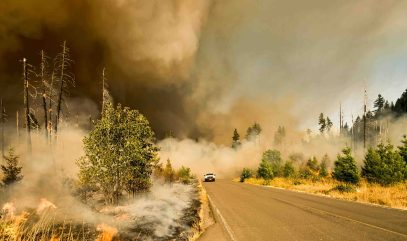Vote NO on 2066
Initiative 2066 is needless and is a solution in search of a problem that doesn’t exist. This initiative actually repeals important planning measures that will keep energy costs lower. While this initiative seeks to ensure consumers have continual access to natural gas, existing state law already guarantees access.
More importantly, we need to reduce burning fossil fuels, including natural gas, to slow climate change. There are already significant economic impacts from our warming climate.
Exceptional drought, the most severe categorization of drought, has serious effects for agriculture. Spokane County and all Western States are in a continued state of exceptional drought. The Washington Association of Wheat Growers has indicated that drought and extreme heat will negatively impact crop yields, which reduces farmer income and profitability. Reduced crop yields have a direct economic impact on our local communities and increase the cost of food.
Additionally, wildfires are increasing the cost of home and commercial insurance (see analysis from MarshMcLennan and Harvard Business Review) and increase negative health outcomes – such as asthma and pulmonary disease – and increase mortality rates (see Spokesman Review and KREM2).
We need to address our contributions to the warming climate. Passing I-2066 would contribute to accelerating climate change and lead to serious impacts on our local economies and overall health of our communities. We can start thoughtfully planning for the future, or we can do nothing and be forced to make significant sacrifices later that have exponentially higher costs than acting now.
The following are facts:
State law already guarantees people can have natural gas if they want it
- There is no existing or pending policy in WA State that will shut off gas to existing customers or to anyone who wants it
- All WA State clean energy policies have a long implementation timeline and allow a thoughtful transition that prioritizes affordability
I-2066 would increase costs for utilities, businesses, and consumers:
- All-electric new construction (i.e., without natural gas) is less expensive than construction that includes gas hookups
- I-2066 would roll back standards for energy efficiencies that will reduce the cost of heating and cooling homes and businesses
- I-2066 would mean more expensive energy bills – utility companies would be required to continue investing in outdated technology and aging infrastructure, and the costs would be passed-on to families and businesses
- Costs will increase for everyone if I-2066 passes because it would repeal key portions of HB 1589 that allow for a more holistic utility planning process that accounts for the fact that natural gas use is already shrinking
- Voting “No” will make energy more affordable (here, here, and here) over time, protecting all Washingtonians, including seniors and families living on low incomes
I-2066 is contrary to free market concepts and prevents local decision making
- I-2066 would prevent towns, cities, and counties from making decisions that work best for their communities – this initiative is an overreach designed to limit local decision making
- For those who support a free-market economy, eliminating private or publicly traded utilities (e.g., Avista) ability to manage their products and services is the opposite of a free-market principle
- Puget Sound Energy supports HB 1589, legislation that I-2066 would largely repeal, because it allows them to plan to reduce pollution per state law and transition to clean energy while keeping rates affordable for their customers
- I-2066 would require utilities to provide access to natural gas in perpetuity and significantly reduce their ability to effectively manage their business (see Section 2.2)
- The initiative would prevent utilities from phasing out a service even if providing the service is cost prohibitive (see Section 4.13). In practice, this means that if only one business in a large area wanted natural gas, all other utility customers would be forced to subsidize them, rather than allowing the utility to provide an alternative form of energy and keep costs lower for everyone
Washington families and consumers want action on climate change
- A 2020 poll of Washington residents indicated that 77% of residents are extremely or somewhat concerned about climate change
- According to Pew Research Center, two-thirds of Americans want government to take more action on climate change, including restrictions on carbon emissions and developing carbon capture
- I-2066 would undermine our path to clean energy and weaken the Clean Air Act, threatening health protections against harmful air pollution
- This initiative runs counter to prevailing sentiment in support of a transition to clean, renewable energy
Heat pumps work & natural gas heating is not immune to power outages
- Electric heat pumps are effective heat sources in cold climates (here and here) – Norway has a colder climate than Spokane and 60% of households in Norway use electric heat pumps
- Electric heat pumps also provide air conditioning while gas furnaces require installation of a separate unit for air conditioning
- It’s a common misconception that gas appliances can continue to run even during power outages – gas furnaces, gas stoves, and most gas-powered water heaters require electricity to operate properly
- Natural gas frequently causes explosions and evacuations, including in Spokane (here, here, and here)
Read More
Vote NO on 2117 - Keep Washington's Climate Commitment Act
Initiative 2117, which effectively repeals Washington State’s Climate Commitment Act (CCA), will negatively impact our local business community through a reduction in planned financial investments in transportation and w
Reject the business case for sustainability: The 1980s wants its business case back
They say a rising tide raises all boats. But there isn’t any raising to be done when the tide no longer comes into the bay – all boats remain stranded. We are often asked about the business case for sustainability. For y
Protect Your Community or Organization with a Climate Action Plan
Introduction Our changing climate impacts every aspect of our lives—our economy, our communities, and the environment—in ways both visible and unseen. While scientists and environmental organizations have long recognized
Witnessing the world of sustainable business firsthand
As a young student with a passion for climate justice and sustainability, it always felt like a contradiction to pursue a degree in business. From what I had witnessed, businesses didn’t necessarily operate ethically. Mu




